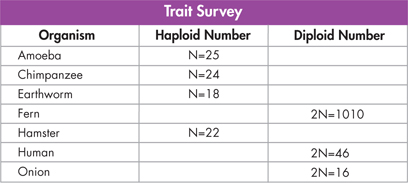COMPARING MEIOSIS AND MITOSIS
 How is meiosis different from mitosis?
How is meiosis different from mitosis?
The words mitosis and meiosis may sound similar, but the two processes are very different, as you can see in Figure 11–17. Mitosis can be a form of asexual reproduction, whereas meiosis is an early step in sexual reproduction. There are three other ways in which these two processes differ.
Replication and Separation of Genetic Material Mitosis and meiosis are both preceded by a complete copying, or replication, of the genetic material of chromosomes. However, the next steps differ dramatically.  In mitosis, when the two sets of genetic material separate, each daughter cell receives one complete set of chromosomes. In meiosis, homologous chromosomes line up and then move to separate daughter cells. As a result, the two alleles for each gene are segregated, and end up in different cells. The sorting and recombination of genes in meiosis result in a greater variety of possible gene combinations than could result from mitosis.
In mitosis, when the two sets of genetic material separate, each daughter cell receives one complete set of chromosomes. In meiosis, homologous chromosomes line up and then move to separate daughter cells. As a result, the two alleles for each gene are segregated, and end up in different cells. The sorting and recombination of genes in meiosis result in a greater variety of possible gene combinations than could result from mitosis.
Changes in Chromosome Number  Mitosis does not normally change the chromosome number of the original cell. This is not the case for meiosis, which reduces the chromosome number by half. A diploid cell that enters mitosis with eight chromosomes will divide to produce two diploid daughter cells, each of which also has eight chromosomes. On the other hand, a diploid cell that enters meiosis with eight chromosomes will pass through two meiotic divisions to produce four haploid gamete cells, each with only four chromosomes.
Mitosis does not normally change the chromosome number of the original cell. This is not the case for meiosis, which reduces the chromosome number by half. A diploid cell that enters mitosis with eight chromosomes will divide to produce two diploid daughter cells, each of which also has eight chromosomes. On the other hand, a diploid cell that enters meiosis with eight chromosomes will pass through two meiotic divisions to produce four haploid gamete cells, each with only four chromosomes.
Analyzing Data
Calculating Haploid and Diploid Numbers
Haploid and diploid numbers are designated by the algebraic notations N and 2N, respectively. Either number can be calculated when the other is known. For example, if the haploid number (N) is 3, the diploid number (2N) is 2 × 3, or 6. If the diploid number (2N) is 12, the haploid number (N) is 12/2, or 6.
The table shows haploid or diploid numbers of a variety of organisms. Copy the table into your notebook and complete it. Then, use the table to answer the questions that follow.
Calculate What are the haploid numbers for the fern and onion plants?

Interpret Data In the table, which organisms' diploid numbers are closest to that of a human?
Apply Concepts Why is a diploid number always even?
Evaluate Which organism's haploid and diploid numbers do you find the most surprising? Why?
Table of Contents
- Formulas and Equations
- Applying Formulas and Equations
- Mean, Median, and Mode
- Estimation
- Using Measurements in Calculations
- Effects of Measurement Errors
- Accuracy
- Precision
- Comparing Accuracy and Precision
- Significant Figures
- Calculating With Significant Figures
- Scientific Notation
- Calculating With Scientific Notation
- Dimensional Analysis
- Applying Dimensional Analysis





